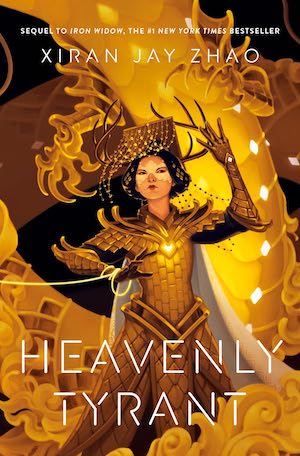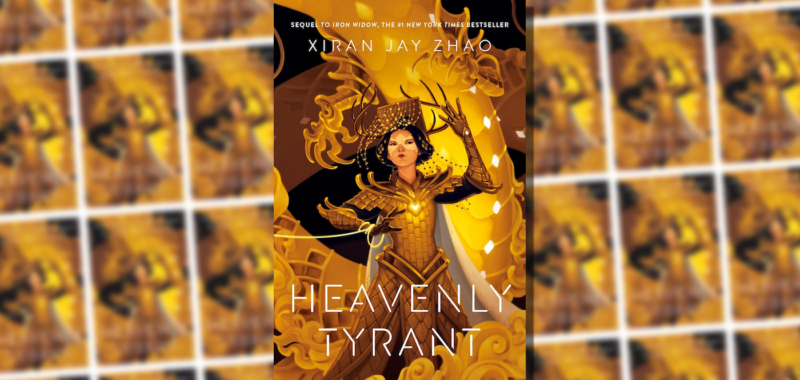Heavenly Tyrant brings us back into the science fantasy world inspired by ancient China that Xiran Jay Zhao introduced us to in her 2021 debut, Iron Widow. It’s an understatement to say numerous revelations and major events happened in that book, and any discussion about its sequel can’t help but spoil some of them. Consider this your spoiler warning for Iron Widow, though I’ll keep major spoilers for Heavenly Tyrant out of this review.
The sequel picks up moments after the end of Iron Widow, where Wu Zetian’s relentless quest for revenge culminates with her destroying the Palace of Sages—the political body that ran her country’s oppressive patriarchal society—in the Yellow Dragon, a Chrysalis or mech she helms with the help of Qin Zheng, an emperor from over two hundred years ago who she unthawed from self-imposed stasis to help her bring the government down. When she destroyed the Palace, she also knowingly caused the death of her remaining family and other innocents in the building, an act that will unsurprisingly haunt her in the pages to come.
Heavenly Tyrant starts with Zeitan still in the Yellow Dragon with Zheng, who has stopped responding to her. Another Chrysalis, still loyal to the old order, attacks the Yellow Dragon; Zetian, exhausted after flying essentially solo, begs Zheng to help her. He wakes up and does so; Zetian passes out from exhaustion. When she wakes up a few days later, Zheng is the emperor of Huxaia and she’s betrothed to him, becoming his empress. But even though she’s now an empress, she’s still literally in shackles, as Zheng can control the spirit armor she wears and orders her to walk around masked so no one else may gaze on her face. In his mind, she is his personal property.
It’s here where Heavenly Tyrant becomes a differently paced book from Iron Widow. Where the first book was plot-driven and action-heavy, the majority of its sequel focuses on political commentary and intrigue more in line (though not in tone) with Katherine Addison’s The Goblin Emperor or the galactic trade routes plot line in Star Wars: The Phantom Menace.
Buy the Book


Heavenly Tyrant
To that end, the first half of the book takes place almost entirely in the capital, where Zetian grapples with her increasingly complex relationship with Zheng and her new position as empress. From the confines of the new palace, she chronicles the changes Zheng makes to Huaxia’s government, where he strips the rich of their wealth, and promises shelter and food to all citizens.
“I thought he was just a fan of killing rich people,” Zetian thinks when Zheng gives his first major speech to the people. “What is this about cancelling all medical and educational debt?”
Although Zhao states at the beginning of Heavenly Tyrant that any parallels we see to our reality “should not be drawn without considering the impacts of the existence of fantasy plot devices such as Chrysalises,” it’s hard with sentences like these not to think of our current state of affairs within its pages.
There are significant differences, of course. Zheng’s decrees include giving women rights they didn’t have before, which he justifies them by declaring they should no longer “fester in unproductive existences.” Foot binding is banned. And for a few hundred pages, we see Zetian grapple with the emperor’s policies, both in how they are implemented—political executions are a daily occurrence—and the logic behind them. Is it truly better if women are now conscripted to be mech fighters if their qi is high enough, whether they want to or not?
Sprinkled within this deep dive into political philosophy, there is movement toward what becomes the driving plot of the last quarter or so of the book. We found out at the end of Iron Widow that their gods are flesh-and-blood and the puppet masters of Huaxia, which includes the perpetuation of the lie that the Hunduns, an alien species who repeatedly attack Huaxia and whose corpses are the material for their Chrysalises, are the planet’s native species. Humans are the invaders, and the “gods” orbiting above in a space station driven by capitalism are the major villains of the story.
As this plot unfolds, Zhao introduces some new characters with intriguing backstories, and while some are developed into interesting characters on their own, others get abruptly (and, to me, disappointedly) sidelined into mouthpieces for political points of view. What eventually comes to the forefront on the relationship side of things is the personal messiness between Zetian and Zheng, which is made all the more complicated by Zetian’s previous lover, Yizhi, becoming a close advisor to the emperor, and by the gods holding their shared partner, Shimin—whose body has been crushed and is barely alive—hostage to keep Zetian in line.
For those pining for more action, the last section of Heavenly Tyrant has you covered. Zhao expands the universe they have created and leans more on the sci-fi side of things than either book has done to date. I personally enjoyed the expansion, both for the questions it raised for the expected third book in the series, as well as how the main characters have (or haven’t) changed and what those changes mean for their relationships with each other. Whatever happens, Zetian remains in the center of it all. She is relentless, and she is sometimes a mess. But she is determined to bring down the gods—and anyone else—who control her and her country by any means necessary. I’m eager to read the third book in this debatable young adult trilogy (while Zetian is eighteen, Heavenly Tyrant checks more boxes as an adult book than a young adult one, in my opinion) to see how it plays out.
Heavenly Tyrant is published by Tundra Books.

